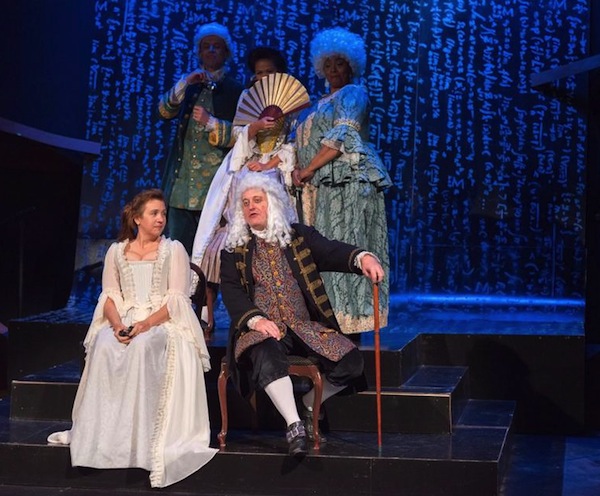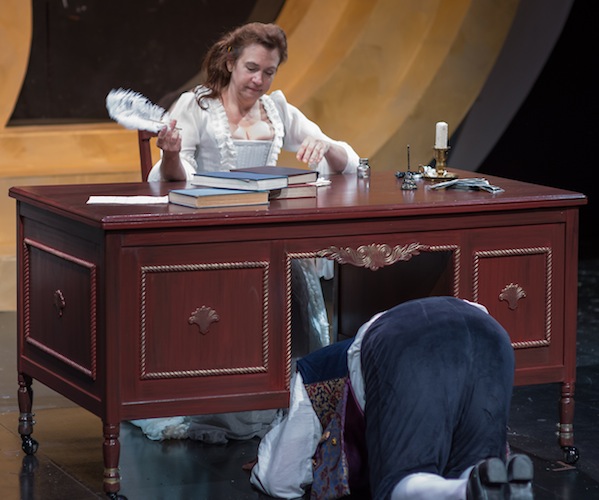Theater Review: Nora Theatre Company’s “Emilie” — Where History, Feminism, and Science Fiction Meet
At its deepest level, Emilie invokes the quest we all undertake to make sense of who we are, where we have come from, and where we are going.
Emilie: La Marquise du Châtelet Defends Her Life Tonight by Lauren Gunderson. Directed by Judy Braha. Staged by the Nora Theatre Company at the Central Square Theater, Cambridge, MA through Oct. 5

Foreground: Lee Mikeska Gardner plays Emilie du Châtelet and Steven Barkhimer is Voltaire. Photo: A.R. Sinclair
By Lin Haire-Sargeant
Emilie: La Marquise du Châtelet Defends Her Life Tonight is a matter of life or death—or, more precisely, life AND death. History, feminism, and science fiction meet in playwright Lauren Gunderson’s audacious set-up: Emilie, a real life 18th-century French intellectual and aristocrat, is summoned to the performance space to make sense of her turbulent life before a metaphysical court that includes the audience. Four versatile actors play family, servants, and lovers of the Marquise, but it is the compelling performance by Lee Mikeska Gardner as Emilie that first entreats and then commands our participation. The result is an intriguing real life story that evolves into a profound ritual about the search for human understanding.
The second we step into the darkened theater, we are abducted to Hades. The sharply raked rows of seats loom in two long mirroring wedges on either side of a trench that is the stage. Taking our places above the glowing blue words inscribed on the floor, we might be celebrants of a ritual, mourners at a burial, or witnesses to a crime. The sunken grave-like space, redolent of an Egyptian tomb or Maya Lin’s Memorial Wall, is flanked by gigantic hollow interlocking rings, perhaps stylized models of atoms. Inscribed with arcane symbols, the big cogged disks frame arrangements of formal antique furniture, including an elegant desk with quill pen, paper, and books. Steven Royal’s set design could stand on its own as a gallery installation; as an environment for this theater piece, it takes us out of this world and into tantalizing possibility.
Bells sound, there is a whirring of wheels and cogs, and Gardner’s Emilie emerges in shroud-white formal court dress, compelled by mysterious forces to replay her life of an aristocratic intellectual in 18th Century France. And what a life it was! Emilie du Châtelet was a real person; as the Nora Theatre Company’s publicity release has it, she was a “leading physicist, cardshark, and all-around bad ass” of the Enlightenment. Blindingly smart, she sought out ever-more accomplished teachers to help her gobble up arts, languages, sciences. The action speeds through Emilie’s tribulations – her early years grappling with a conventional mother, marriage to a complaisant husband — to linger on her friendship with the cerebral giant Voltaire. The play shows them making a home together with Emilie’s husband as well as a revolving circus of visiting top intelligentsia and fashionable elite, conducting scientific experiments, writing and producing plays in the theater Voltaire designed. It’s a vision of an Enlightenment Eden, complete with an apple supplied by Voltaire’s idol Newton, whose ideas Emilie dares to challenge.
Her extraordinary mind makes her an adventurer in a dangerous world of intellectual male privilege, but like any woman of her time, her body puts her at even greater risk. She is prey to the propagation of “progeny,” a word used with the full weight of its possible meanings. With Voltaire, famously her long-time friend, lover, and intellectual fencing partner, these include challenging essays on the nature of fire, both eventually published by the Académie française. Unbowed by the trashing of establishment critics (including Voltaire!), Emilie goes on to translate Newton’s Principia Mathematica and write a physics text, but her prodigious creative flow is interrupted by an unsought and disastrous pregnancy. The outcome leaves her with unfinished business, and leads to a dramatic excursion into judgment through the use of time-travel.

Lee Mikeska Gardner and Steven Barkhimer in the Nora Theatre Company production of “Emilie: La Marquise du Châtelet Defends Her Life Tonight.” Photo: A.R. Sinclair Photography.
Plenty of weight and consequence here, but watch out for high jinks! This is a play that frequently throws us off balance. Gardner’s Emilie and Steven Barkhimer’s Voltaire generate plenty of laughs and considerable sexual voltage in their intellectual combat, swapping verbal thrusts like the Tracy and Hepburn of the Philosophes. In her portrayal of the Marquise, Gardner fairly bristles with intelligence, her mind and expression ranging swiftly over questions, possibilities, proofs and refutations.
It’s decidedly Emilie’s play, so perhaps it is intentional that Voltaire should come off as a little ponderous in contrast. Even though we expect gender roles to reverse, it is still jolting to see Voltaire, the Great Man of the Enlightenment, whining for more of Emilie’s attention as she shoos him away from her desk. We are invited to see this is a ‘true’ re-creation, a faithful re-enactment, of the historical Marquise du Châtelet, but the male thinker we are given is sketchy, sometimes a caricature of a fond and buffoonish older lover which lacks the charisma of the real Voltaire. Still, Barkhimer’s Enlightenment Man is whimsically attractive; he and Gardner generate a lively chemistry that grows into an engaging relationship that is the human heart of the play, an emotional connection that stoutly sustains all the metaphysical acrobatics. Director Judy Braha moves the talented supporting cast (Sophorl Ngin, Lewis D. Wheeler, and Michelle Dowd) through a symbolic set with energy and dramatic intention.
At its deepest level, Emilie: La Marquise du Châtelet Defends Her Life Tonight invokes the quest we all undertake to make sense of who we are, where we have come from, and where we are going. The universe gives Emilie the opportunity to survey the panorama of her life, even to confront her ‘living’ self to find answers to difficult questions. We are invited to survey and confront our own lives, with the understanding that the desire for Enlightenment is all. As the playwright concludes, “All we have is the meaning.”
Lin Haire-Sargeant directs the MassArt Playwriting Workshop, which gathers Boston-area playwrights and actors together every two weeks to read and critique new work. A novelist (H.–The Story of Heathcliff’s Journey Back to Wuthering Heights) and playwright (Dead; Green Pastures), Lin is Professor of Literature and Writing at Massachusetts College of Art and Design.

